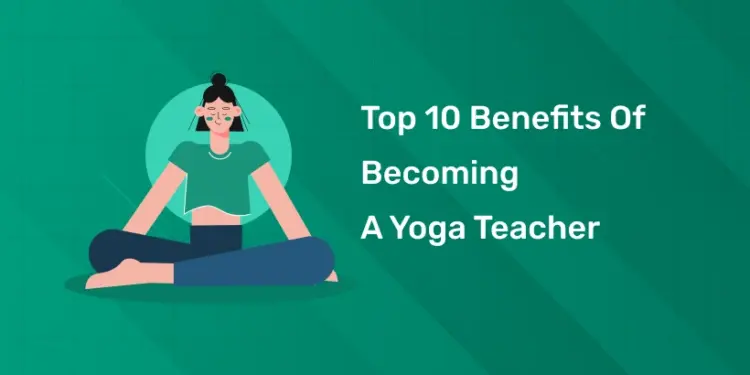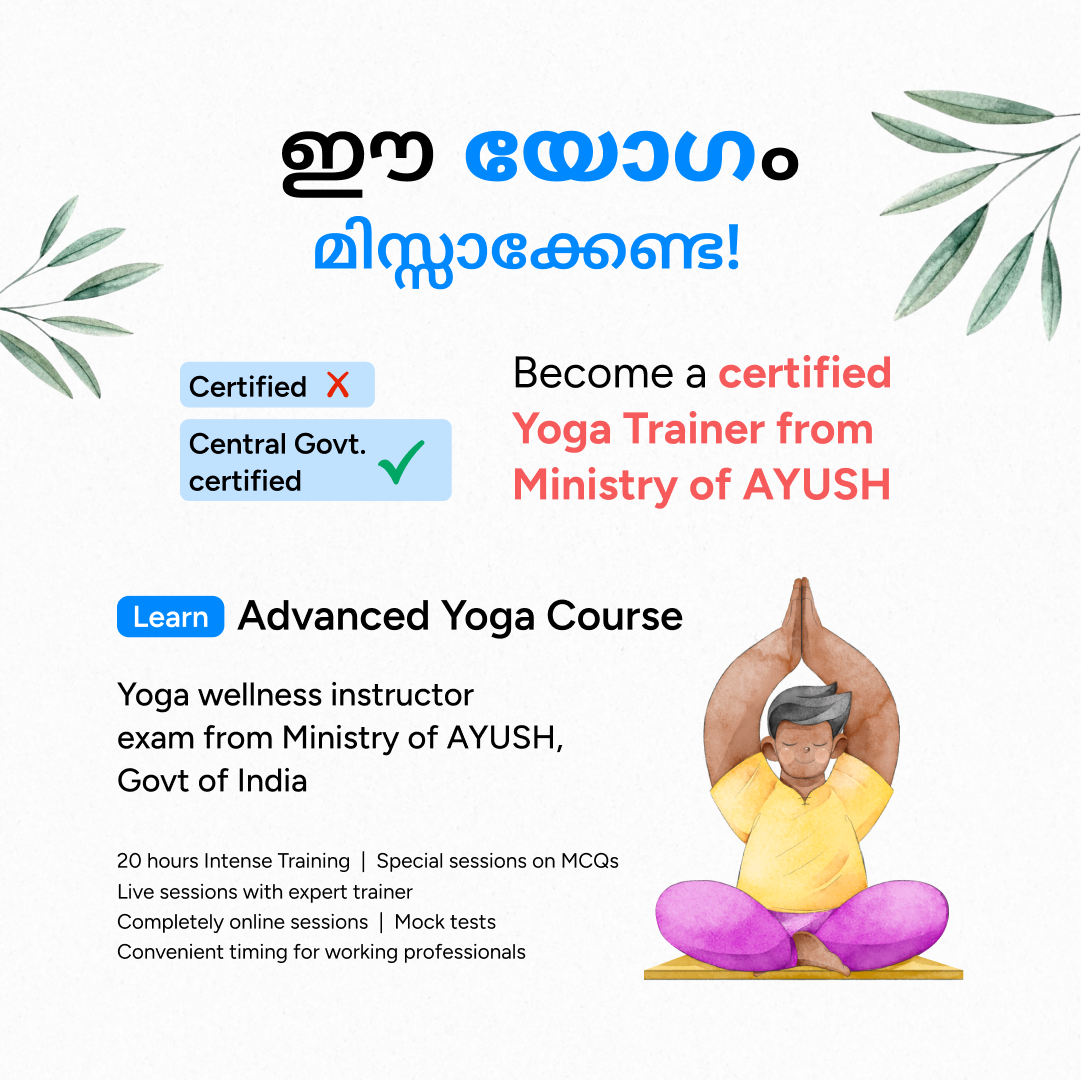Table of Contents
Yoga is more than just a way to get in shape Its a complete and profound system for building strength, mobility, mastering your breath, tuning your focus, and staying calm under pressure – skills that have become a top priority for people looking to tame their stress levels, break free from a sedentary lifestyle and the weight of burnout.
If you have ever left a yoga class feeling somehow lighter, calmer and more like yourself – you already have a sense of the quiet power that yoga can bring into your life. And when you become a yoga teacher, you get to share that transformation with others, putting your own personal growth to use in a real and meaningful way.
This blog is an expansion on the changing landscape of the yoga profession, which has grown increasingly in demand for its therapeutic benefits and now more than ever online teaching is a growing part of the industry.
Get Certified, Get Confident! Join Our Yoga Teacher Training Course!
Who can be a Yoga Teacher?
Anyone can become a yoga teacher if they have got:
- A real commitment to putting in the time on your practice – and consistency beats perfection any day
- A willingness to learn the nuts and bolts of anatomy, alignment, breathwork and how to sequence safely
- Good communication skills and a genuine interest in helping people
- And the discipline to actually finish a teacher training program and keep on learning
You don’t need to be some super flexible superstar – you just need to be someone who shows up, is aware of what is going on, and is willing to learn.
How to become a Yoga Teacher?
1: Which of these is the primary goal of yoga practice?
Becoming a certified yoga teacher is something that happens in steps, and here’s how to do it:
1. Get a consistent practice going
Try out a few different styles (Hatha, Vinyasa, Ashtanga, Iyengar, Restorative) and figure out what really speaks to you
2. Decide early on what kind of yoga you want to teach
Right now, the demand is really high for yoga that can help with stress relief, back pain and the like, and there are people calling out for more prenatal yoga, yoga for seniors, yoga for corporate types and more breathwork
3. Sign up for a teacher training program
Look for one that covers the basics: asanas, alignment, anatomy, pranayama, meditation, teaching techniques, ethics and practice teaching under supervision
4. Start teaching before you think you are ready
Like with anything, confidence comes from doing something over and over – this means getting a handle on cueing, correcting safely, managing groups, and figuring out how to adapt to different bodies
5. Get some teaching hours in and build up your reputation
Start by teaching for free in your community if you need to, then collect as much feedback as you can get, and make a little portfolio to show off your skills (testimonials, a few videos, outline of your classes)
6. Keep on learning – it is a never-ending process
Yoga is getting more competency-based and inclusive all the time, and now you can get as much of your training done at home as you want to – schools are offering all sorts of different formats these days.
Your Journey to a Fulfilling Yoga Career Starts Here! Get Free Demo Classes Here!
Become a Certified Yoga Instructor
Yoga Teacher Training Course by Entri App: Master authentic yoga techniques, earn certification, and build a successful career as a professional yoga instructor.
Join Now!Top 10 benefits of becoming a Yoga Teacher
Becoming a yoga teacher can offer a range of personal and professional benefits. Here are the top 10 benefits of becoming a yoga teacher:
Deepen Your Practice:
Teaching yoga forces you to deepen your own practice. As you guide others, you’ll refine your understanding of yoga postures, alignment, and philosophy.
Share Your Passion:
If you have a genuine love for yoga, becoming a teacher allows you to share this passion with others, helping them discover the physical and mental benefits of yoga.
Health and Well-being:
Regular practice and teaching of yoga can contribute to your own physical and mental well-being, promoting flexibility, strength, stress reduction, and overall health.
Teaching Skills:
You’ll develop valuable teaching and communication skills, which can be applied not only in yoga but also in various aspects of life.
Positive Impact:
Yoga teachers often have a profound impact on their students’ lives, helping them overcome physical and emotional challenges, reduce stress, and improve their overall quality of life.
Flexibility and Independence:
Many yoga teachers enjoy the flexibility of setting their own schedules, choosing where and when to teach, and having the potential for self-employment.
Community and Connection:
You’ll become part of a supportive yoga community, connecting with like-minded individuals who share your passion for health and wellness.
Lifelong Learning:
Yoga is a lifelong journey, and teaching allows you to continue learning and growing, both personally and professionally.
Income Potential:
While income can vary, teaching yoga can be a fulfilling source of income. Many teachers supplement their earnings by offering private sessions, workshops, and retreats.
Mindful Living:
Teaching yoga encourages a mindful and balanced lifestyle, promoting self-awareness, stress management, and a sense of purpose.
Yoga Teacher Training – Learn from Experienced Instructors! Get Free Demo Here!
Explosive Market Growth
The yoga industry isn’t just growing; it is on fire. It hit a whopping ₹9,100 crore (around $107 billion) in 2025 and is expected to skyrocket to ₹11,900 crore ($140 billion) by 2028. This is driven by a wellness craze and the rise of online learning. In India this all translates to a deluge of teaching gigs – whether it’s a studio lead, corporate wellness program or just a simple online session.
Kerala is especially interesting – demand for certified therapeutic yoga instructors has shot up by 25% in the past little while. This is the case in urban areas like Kochi where people are feeling the need for some serious stress relief. Teachers with experience are ending up with all sorts of income streams – studio classes, retreats, online sessions. It’s no wonder that yoga teaching is looking like one of the most rewarding paths in the wellness industry right now.
Evolving Certifications
Those days of one-size-fits all training are well and truly over. Yoga Alliances new standards for 2025 are all about equity, diversity, inclusion and accessibility. So now certifications are more structured and a whole lot more ethical. They’re pushing for these massive 300-hour advanced programs that meld trauma informed practices with actual neuroscience insights. In that case, every teacher has to go through some kind of inclusivity training.
Local players like Entri App are also doing some great stuff with their 2025 courses – you could basically learn some Ayurveda and diet modules and become a total holistic guide. Even some of the newer certifications are getting into neuroplasticity – how yoga actually changes your brain – which is a total gamechanger for you as a teacher.
Pro tip: If you want to stay on top of your game and still honour all that yoga is about – prioritize those courses with lots of supervised teaching opportunities, some actual science thrown in, and a solid foundation in inclusivity.
Become a Certified Yoga Instructor
Yoga Teacher Training Course by Entri App: Master authentic yoga techniques, earn certification, and build a successful career as a professional yoga instructor.
Join Now!Tech Revolution: Hybrid Classes and AI
Yoga’s breaking free from studio walls, thanks to tech. Yoga Alliance now greenlights in-person, online, or hybrid formats, as long as there’s a synchronous (live) component. By 2026, over 60% of classes are hybrid, letting experienced instructors earn ₹50,000 to ₹1,50,000 monthly from remote gigs.
Platforms like Zoom open doors to global students, with you setting prices and schedules. AI tools for real-time posture analysis are game-changers too – vision-based apps correct beginners on the spot, making your classes more effective and scalable. In Kerala, this means tech-savvy teachers are blending tradition with innovation for wider reach.
Holistic Wellness Boom
Today’s yoga teaching is about total transformation: movement, breath, stress down-regulation, and lifestyle tweaks. Backed by 2025 studies, breathwork alone can slash cortisol by 40% post-session, proving yoga’s real edge in anxiety relief.
In Kerala, ecofeminism-inspired practices are rising, weaving nature connection with gender wellness for deeper healing. Teachers fusing yoga with mental health tools – like trauma screening and safe adaptations – are seeing profound student impacts. Teach responsibly, skip hype, and watch your classes become life-changing.
The yoga world in 2026 is more accessible, lucrative, and impactful than ever – especially in India. Whether you’re eyeing “yoga teacher certification in Kerala” or online therapeutic yoga paths, the momentum is yours to grab.
Conclusion
Becoming a yoga teacher is a journey that will change you – not just on the outside, but on the inside too. As you go deeper into your own practice, you’ll start to notice the difference in your overall physical and mental wellbeing, which is just the beginning. Teaching yoga also becomes a journey of self-discovery and learning as you navigate the nuances of guiding and supporting others in their own paths to health and wellness – this in turn fosters a real sense of community and connection, with like-minded people who will be with you every step of the way.
The sheer flexibility of scheduling and the variety of career paths available to you as a yoga teacher also means that you get to be your own boss and live a life that really fulfils you. The truth is, becoming a yoga teacher isn’t just a job choice – it’s a way of life that will feed your soul and help others too.
Discover the Art of Teaching Yoga – Join Our Teacher Training Program!
Become a Certified Yoga Instructor
Yoga Teacher Training Course by Entri App: Master authentic yoga techniques, earn certification, and build a successful career as a professional yoga instructor.
Join Now!Frequently Asked Questions
What are the physical benefits of becoming a yoga teacher?
Becoming a yoga teacher often involves regular practice and teaching of yoga postures, leading to improved physical fitness, flexibility, and strength.
Will becoming a yoga teacher improve my mental well-being?
Yes, teaching yoga encourages a deeper understanding of mindfulness and meditation techniques, which can reduce stress, anxiety, and contribute to better mental health.
Can I make a career out of teaching yoga?
Yes, many yoga teachers have successful careers teaching at studios, leading retreats, offering private sessions, and even specializing in yoga therapy or wellness coaching.
Is teaching yoga a flexible career option?
Yes, teaching yoga often provides flexibility in scheduling, allowing for work-life balance and independence in managing your career.
How does teaching yoga foster personal growth?
Teaching yoga requires ongoing self-reflection, self-awareness, and self-confidence as you guide others on their transformative journeys, leading to personal growth and self-discovery.
Are there opportunities for networking and building a yoga community as a teacher?
Yes, teaching yoga allows you to connect with a diverse community of students, fostering a sense of belonging and support within the yoga community.
Is it possible to continue learning and advancing my yoga knowledge as a teacher?
Yes, teaching yoga is a continuous learning process. You’ll have opportunities to explore various yoga styles, philosophies, and techniques throughout your career.
What are the long-term benefits of teaching yoga?
The long-term benefits of teaching yoga include improvement in personal practice, physical and mental health.A fulfilling career, and the power to make a positive impact on others’ lives.
Are there specific qualifications required to become a yoga teacher?
Qualifications vary, but most yoga teacher training programs require a minimum level of yoga experience and successful completion of a certified yoga teacher training program.
Can I teach yoga as a part-time job or alongside another career?
Yes, many yoga teachers teach part-time or alongside other careers, making it a flexible and accessible career option.



























